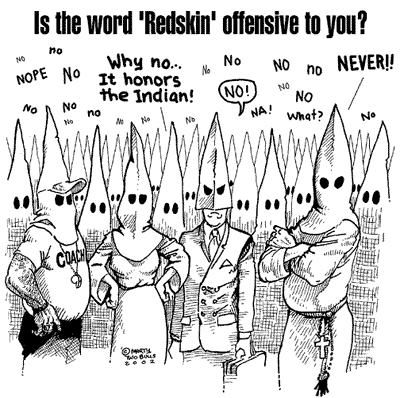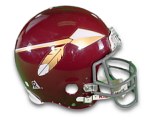 Another Stereotype of the Month entry:
Another Stereotype of the Month entry:
 Another Stereotype of the Month entry:
Another Stereotype of the Month entry:
From the Washington Times:
October 7, 2003
Redskins win over PC
By Bruce Fein
Native American activists have apparently become spoiled children of political correctness. That pampering finds expression in their attempt to censor words or displays that they find disagreeable.
Exemplary has been their 11-year-old endeavor to cancel six federal trademark registrations of the Washington Redskins professional football team. Susan Shown Harjo and six other Native Americans have insisted since 1992 that use of the word "redskin" "may ... disparage" Native Americans, and may cast them into "contempt or disrepute" in violation of the Lanham Trademark Act of 1946.
But their trademark registration cancellation crusade was defeated last week by a federal district court decision in Pro-Football Inc. vs. Susan Shown Harjo (Sept. 30, 2003).
It is altogether fitting that Native Americans vigilantly fight derogatory or demeaning language that fosters cultural prejudices or discriminatory behavior. The 1864 Sand Creek massacre, Gen. Phil Sheridan's "the only good Indian is a dead Indian" creed, and routine violations by the federal government of Indian treaties demonstrate the propensity of bigotries to father dastardly deeds. But the case against the Washington Redskins races beyond vigilance into the domain of paranoia.
In September 1992, Ms. Harjo and her colleagues petitioned the Trial Trademark and Appeal Board (TTAB) to cancel six trademarks of the Redskins that had been registered years earlier with the Patent and Trademark Office without protest or rancor.
One of the trademarks attacked ("The Redskins") had been filed with the PTO on July 14, 1966, for use in connection with football games and their broadcasts. It elicited no opposition. The trademark was granted on Sept. 26, 1967, and, thereafter vast sums were invested in marketing and developing the brand in reliance on the mark's validity.
The ensuing decades witnessed climbing popular, legislative and judicial sensitivity and occasional overreaction to past maltreatment of Indians.
The U.S. Supreme Court in United States vs. Sioux Indian Nation of Indians (1980) held the United States liable for $100 million to the Sioux Nation for an ancient treaty violation that facilitated the mining of gold by white pioneers in the Black Hills within a Sioux reservation. In County of Oneida vs. Oneida Indian Nation (1985), the high court sustained the right of an Indian tribe to seek two centuries of damages for a conveyance of 100,000 acres by their ancestors to the state of New York under a 1795 agreement concluded without the consent of Congress in violation of the 1793 Nonintercourse Act.

The Indian Child Welfare Act crowned tribes with unprecedented powers to block the adoption of Indian children by non-Indians. Congress also ordered the expeditious repatriation of Native American human remains and associated funerary objects by federal agencies and museums, and, granted an exemption from federal anti-drug prohibitions for the religious use of peyote.
Place names and mascots were abandoned by cities and schools to avoid the appearance of slighting Native Americans. And tribes fortified this trend by employing their opulent gambling earnings to influence political elections, such as the recall election of California Gov. Gray Davis.
Native Americans have become so accustomed to courtship that even trifles light as air are perceived as racist or insulting. That explains the legal frolic against the Washington Redskins' registered trademarks. Consider the evidence relied upon by the TTAB as proof that "Redskins" when used to identify the team "may disparage" Native Americans, a conclusion reversed by U.S. District Judge Colleen Kollar-Kotelly.
The TTAB found the word "redskins" has historically been a reference to Native Americans; that the word has fallen in desuetude for 50 years, except in the Washington Redskins' team name; and, for the past half-century, that Native Americans have not been characterized in derogatory or condescending language. The board did not find that anyone understood the football team name as a slight or aspersion on Native Americans.
It also relied on a survey of a former adjunct professor of psychology, Dr. Ivan Ross, whose purpose was "to determine the perceptions of a substantial composite of the general population and of Native Americans to the word 'redskin(s)' as a reference to Native Americans." The survey, however, did not ask participants whether they believed the Washington Redskins team name might disparage Native Americans.
Instead, it framed a question calculated to inflate negative responses: namely, whether the participant would find offensive the terms "Native American," "buck," "brave," Redskin," "Injun," "Indian," or "squaw."
The Ross survey was also unrepresentative. It sampled only 50 counties in 12 states, or 2 percent of all United States counties, and showed a response rate of less than 50 percent. Its findings that 46.2 percent of the general population and 36.6 percent of the Native American population would be offended by the term "redskin" were wildly erroneous extrapolations from the skewed samplings. Moreover, they were marginal to proof of disparagement, the legal touchstone for cancellations of trademarks, because the term "offensive" includes a broader sweep of the negative responses.
The TTAB observed that half the dictionaries in the record defined redskin pejoratively, half rejected any usage labels, and none placed a characterization on the word when used to mean the Washington-area professional football team. The board also noted that since the 1950s, the word does not appear as a synonym for "Indian" or "Native American." But without any further evidence, it leaped to the conclusion that the disappearing use of "redskins" was because it carries a pejorative or disparaging connotation, as opposed to a neutral explanation for non-usage.
Indeed, the TTAB underscored that during the registration years in question, Pro-Football reflected society generally in employing Native American imagery in a dignified and respectful manner. But it insisted that disparagement was proven by the episodically pejorative use of "redskins" by football fans, sportswriters, and broadcast announcers.
That conclusion was discredited by District Judge Kollar-Kotelly's retorts that the views of Native Americans were at issue, not those of attendees and reporters of football sporting events; and, that Pro-Football was not responsible for uncouth or disreputable conduct of others, which, in any event, cast no light on whether the Washington Redskins team name as opposed to the term "redskins" in other contexts was disparaging to Native Americans.
Genuine racial discrimination against Native Americans and a balanced understanding of history is too important to be diverted by larks against innocuous sporting names like the Redskins. Native Americans should not ape the boy who called "wolf" too often.
Bruce Fein is a founding partner of Fein & Fein.

Rob's reply
>> Native American activists have apparently become spoiled children of political correctness. That pampering finds expression in their attempt to censor words or displays that they find disagreeable. <<
"Their" attempt? What about all the non-Indians who find words like "redskins" and "squaw" offensive? What about the dictionaries that declare "redskins" pejorative? Does Fein think Native activists write these dictionaries? Or what, exactly?
As for the "political correctness" charge, see Political Correctness Defined for more on the subject.
>> Native Americans have become so accustomed to courtship that even trifles light as air are perceived as racist or insulting. <<
When half the dictionaries declare "redskins" to be pejorative? One wonders what percent of dictionaries would have to declare it pejorative before Fein would admit the "trifle" is heavier than air?
>> and, for the past half-century, that Native Americans have not been characterized in derogatory or condescending language. <<
Peruse the Stereotype of the Month contest for examples of Natives characterized in derogatory or condescending language.
>> The survey, however, did not ask participants whether they believed the Washington Redskins team name might disparage Native Americans. <<
Vulgarisms about people like "redskins" disparage people by definition.
>> The Ross survey was also unrepresentative. It sampled only 50 counties in 12 states, or 2 percent of all United States counties, and showed a response rate of less than 50 percent. <<
Spare us the babblings of non-statisticians. Whenever someone doesn't like a survey result, he claims the survey is unrepresentative without proof. Good statisticians would choose representative counties for their samples and take into account a moderate response rate. Fein has no evidence whatsoever that the survey's methodology was flawed.
>> Its findings that 46.2 percent of the general population and 36.6 percent of the Native American population would be offended by the term "redskin" were wildly erroneous extrapolations from the skewed samplings. <<
Even worse, Fein has no evidence the survey sample was biased against the word "redskins" rather than for it. Perhaps 50%, 60%, or 70% of the population finds the word "redskins" offensive, not just 46.2%. Fein has no way of knowing.
>> Moreover, they were marginal to proof of disparagement, the legal touchstone for cancellations of trademarks, because the term "offensive" includes a broader sweep of the negative responses. <<
Again, an offensive word about people, such as a vulgarism, is disparaging by definition.
>> The TTAB observed that half the dictionaries in the record defined redskin pejoratively, half rejected any usage labels, and none placed a characterization on the word when used to mean the Washington-area professional football team. <<

Spare us the sophistry of football-fan judges and other apologists. Few if any dictionaries will list football teams and judge whether their names are pejorative. If a word is pejorative, it's pejorative whether it's used for a joke, a commercial, or a football team.
By the way, dictionaries generally don't "reject" usage labels. What Fein probably means is that the dictionaries didn't use usage labels. That probably means they haven't decided if "redskins" is pejorative, not that they've rejected the possibility.
>> But without any further evidence, it leaped to the conclusion that the disappearing use of "redskins" was because it carries a pejorative or disparaging connotation, as opposed to a neutral explanation for non-usage. <<
Fein wants "evidence" that society has abandoned a word for reasons other than its offensiveness. What form would such evidence take? This is more sophistry. One doesn't have to prove that negative words fall into disfavor because they're negative. Not only is it proved by many historical examples, it's inherently obvious.
>> that Pro-Football was not responsible for uncouth or disreputable conduct of others, which, in any event, cast no light on whether the Washington Redskins team name as opposed to the term "redskins" in other contexts was disparaging to Native Americans. <<
By this tortured "logic," the Washington Redskins could rename itself the Washington Niggers. As long as the team didn't "intend" disparage anyone with the name, the judge presumably would find it blameless. What sophistry!
>> Bruce Fein is a founding partner of Fein & Fein. <<
Spoken like a true nigger, kike, or wop. Pardon me, but I don't mean these terms the way the dictionary defines them. I mean them the way people who don't find them offensive mean them. You know, as colorful but value-free nicknames.
In other words, I think Fein is a nigger, kike, or wop the same way he thinks a Washington football player is a "redskin." I hope Fein doesn't find these terms offensive, because his opinion is as irrelevant as the Native opinions he deems irrelevant.
Related links
RedĚskin n. Dated, offensive, taboo
Squelching the s-word
Team names and mascots
|
. . . |

|
All material © copyright its original owners, except where noted.
Original text and pictures © copyright 2007 by Robert Schmidt.
Copyrighted material is posted under the Fair Use provision of the Copyright Act,
which allows copying for nonprofit educational uses including criticism and commentary.
Comments sent to the publisher become the property of Blue Corn Comics
and may be used in other postings without permission.